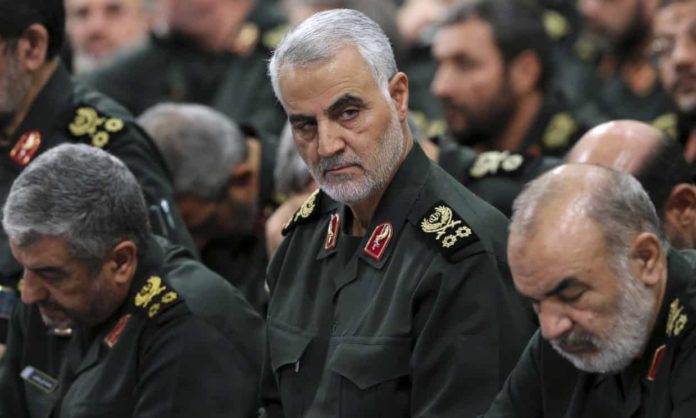Top military leader delivers message at Baghdad meeting as tensions rise.
Iran’s most prominent military leader has recently met Iraqi militias in Baghdad and told them to “prepare for proxy war”.
Two senior intelligence sources said that Qassem Suleimani, leader of Iran’s powerful Quds force, summoned the militias under Tehran’s influence three weeks ago, amid a heightened state of tension in the region. The move to mobilise Iran’s regional allies is understood to have triggered fears in the US that Washington’s interests in the Middle East are facing a pressing threat. The UK raised its threat levels for British troops in Iraq on Thursday.
While Suleimani has met regularly with leaders of Iraq’s myriad Shia groups over the past five years, the nature and tone of this gathering was different. “It wasn’t quite a call to arms, but it wasn’t far off,” one source said.
The meeting has led to a frenzy of diplomatic activity between US, British and Iraqi officials who are trying to banish the spectre of clashes between Tehran and Washington and who now fear that Iraq could become an arena for conflict.
The gathering partly informed a US decision to evacuate non-essential diplomatic staff from the US embassy in Baghdad and Erbil and to raise the threat status at US bases in Iraq. It also coincided with a perceived separate risk to US interests and those of its allies in the Persian Gulf and led to a heightened threat that more than a decade of proxy conflicts may spill over into a direct clash between Washington and Tehran.
Leaders of all the militia groups that fall under the umbrella of Iraq’s Popular Mobilisation Units (PMUs) were in attendance at the meeting called by Suleimani, the intelligence sources claimed. One senior figure who learned about the meeting had since met with western officials to express concerns.
As the head of the elite Quds force, Suleimani plays a significant role in the militias’ strategic directions and major operations. Over the past 15 years, he has been Iran’s most influential powerbroker in Iraq and Syria, leading Tehran’s efforts to consolidate its presence in both countries and trying to reshape the region in its favour.
The US has become increasingly vocal about the activities of Iranian proxies in the Middle East. Donald Trump this month named Palestinian Islamic Jihad, a western-designated terrorist group financed by Iran and Lebanon’s Hezbollah, as partly responsible for a barrage of rockets fired from Gaza into Israel.
On Sunday, four ships – two of them Saudi oil tankers – were reportedly sabotaged off the UAE coast. The following day, drones launched by Iranian-allied rebels in Yemen attacked two Saudi pipelines. Saudi state media on Thursday called for “surgical strikes” against Iranian targets in response and its senior officials have told Washington that they expect it to act in its interests.
Adding to concerns is a belief that a convoy of Iranian-supplied missiles was last week successfully transported across Iraq’s Anbar province into Syria, where it was transferred safely to Damascus, regional diplomats told the Guardian. The transfer managed to evade US and Israeli intelligence, despite the latter’s interdiction of dozens of alleged missile deliveries in the past three years that have been flown into various Syrian airbases via an airbridge.
Fears of an Iranian-run land corridor emerging from the fight against the Islamic State, in which Shia militia groups played a prominent role, have been central to concerns that postwar Iraq and Syria could be subverted by regional manoeuvrings.
That Iran could emerge emboldened from the Isis fight has dominated recent discussions among Donald Trump’s uber-hawks, the national security adviser, John Bolton, and the secretary of state, Mike Pompeo, both of whom are central to an escalating US sanctions programme and Washington’s abandonment of an international nuclear deal signed by Tehran and the former US president Barack Obama.
The Trump administration has remained wary of the Iraqi militias. Although they jointly led the fight against Isis, such groups were integrated into the Iraqi state structure, and have drawn increasing comparisons with Iran’s Revolutionary Guards Corps. While they include some Sunni, Christian and Yazidi units, they are dominated by Shia groups, the most powerful of whom enjoy the direct patronage of Iran.
The British foreign secretary, Jeremy Hunt, appeared to align the UK on Thursday with US claims that Tehran’s threat posture had changed. “We share the same assessment of the heightened threat posed by Iran,” he said on Twitter. “As always we work closely with the USA.”
Earlier this week, a British general challenged the Trump administration’s claims that an imminent threat had emerged from Iran, creating a rare public schism between the two countries whose alliance has at times been tested by the erratic nature of Trump’s regional policy.
The UK, though, is understood to have been central to the recent concerns being raised, and efforts to de-escalate a crisis in which the US has imposed a “maximum pressure” strategy on Iran and Iranian officials have vowed to defend their interests, in the face of hardline sanctions and an oil blockade that is biting deep into Tehran’s coffers.
Tehran’s ambassador to the United Nations, Majid Takht-e Ravanchi, told US broadcaster NPR that Iran was not interested in escalating regional tensions but had the “right to defend ourselves.”
The US has ordered a naval battle group and a squadron of B-52 bombers to the region, in response to the perceived increased threat. In Yemen, meanwhile, where a Saudi-led war against Iranian-allied Houthi forces is into its fifth year, early-morning airstrikes killed six people, including four children, a health ministry official said.


































